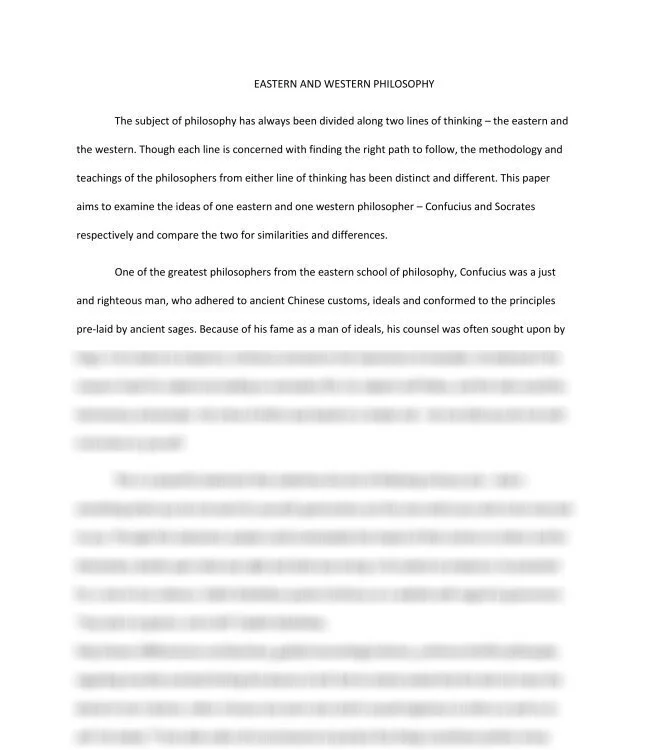EASTERN AND WESTERN PHILOSOPHY The subject of philosophy has always been divided along two lines of thinking – the eastern and the western. Though each line is concerned with finding the right path to
EASTERN AND WESTERN PHILOSOPHY The subject of philosophy has always been divided along two lines of thinking – the eastern and the western. Though each line is concerned with finding the right path to
(Vadim (as 1. 11, 2. 2009 3. 4. AND According Aristotelian Aristotle Aristotle(384-322 Aristotle. Aristotle’s BCE), Because But By Chinese Confucian Confucius Confucius, Eastern For He His However, I In June Kotelnikov Kotelnikov, Moreover, On One PHILOSOPHY References- Since Socrates Socrates’ The They This Though Through Turning Vadim WESTERN Western a able absoluteness, action action. actions actions, actions. acts adhered advice agree agreed aim aims all along also always am amount an ancient and appealing. appearance, applied are as bad base based be been before belief believe believe, believed benefit benefits best between biggest biological by can caused circumstances clearly compare concerned conformed constitutes consuming contemplate contrary, contrast convinced could counsel customs, decide deduced deficiency deficiency. defining definiteness. denial describe desires desires, deterioration detrimental development did differed difference differences. different. discretely distinct divided do doer. done each earnestness eastern eating either emperor emperors, enhances enough ensure entire ethics everything examine examples. excess exemplary extremities fame finding five follow, following food for formlessness, four from further gave generosity goal good govern, governance gravity, greatest happiness happiness, happiness. happy, harmonious has have having he health, his http://chinahistoryforum.com/lofiversion/index.php/t19413.html http://www.1000ventures.com/business_guide/crosscuttings/cultures_confucius.html http://www.1000ventures.com/business_guide/crosscuttings/cultures_confucius.html) http://www.1000ventures.com/business_guide/crosscuttings/cultures_confucius.htmlHis http://www.philosophypages.com/ph/aris.htm#top http://www.virtuescience.com/middle-path.html idea ideal ideals ideals, ideas if impact importance in indefiniteness instance, intellectual involved irrespective is it it. its job just kill” kindness” kings. knowledge kotelnikov, lay lead leading leads leaned less life life, limiting line lines logic logic, logical. make man man, many mean methodology middle morality morality; more much my natural nature need non-violence. not not, not. notion o of often on one ones one’s opinion, or origin others others. paper path path, people per perfect perform performing performs person phenomena. philosopher philosophers philosophies philosophy philosophy) philosophy, physical pleasure points. powerful practice practicing pre-laid preached preserves principles processes. properties properties, prosper. provided purpose pursuit. quotes rather reality. reasoning reasoning, reasoning. regard regarding respectively retrieved returned right righteous rule sages. school scientific self. sensation should similarities simple sincerity, six something sought soul, state stated stated, statement statement, states, stressed strived subject subjects systematic teachings tend terms than that the their themselves, then, theories theory these they things thinking this thought, three to too totally towards true twEASTERN two under underlines underlying understand understanding upon us virtue virtue, virtue. virtue; virtuous want was we website well were western western. what whether which while who will wish with would wrong. you you. yourself, yourself. – “To “Your
EASTERN AND WESTERN PHILOSOPHY
The subject of philosophy has always been divided along two lines of thinking – the eastern and the western. Though each line is concerned with finding the right path to follow, the methodology and teachings of the philosophers from either line of thinking has been distinct and different. This paper aims to examine the ideas of one eastern and one western philosopher – Confucius and Socrates respectively and compare the two for similarities and differences.
One of the greatest philosophers from the eastern school of philosophy, Confucius was a just and righteous man, who adhered to ancient Chinese customs, ideals and conformed to the principles pre-laid by ancient sages. Because of his fame as a man of ideals, his counsel was often sought upon by kings. In his advice to emperors, Confucius stressed on the importance of examples. He believed
